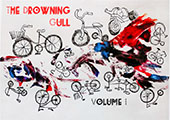New Lit on the Block :: The Drowning Gull
 The Drowning Gull online biannual of art, nonfiction, poetry and fiction hails an eclectic editorial staff: Tiegan Dakin, a poet and artist living in New South Wales, Australia; Rebecca Valley, poet and writer living in Washington state; Shonavee Simpson, Australian freelancer from Newcastle; and Katelyn Dunne, a Chicago native currently living in Kentucky to attend university. “Living in different parts of the world,” says Dakin, “makes communication difficult at times. But we all have a common love of publishing, so we try tirelessly to make it work.”
The Drowning Gull online biannual of art, nonfiction, poetry and fiction hails an eclectic editorial staff: Tiegan Dakin, a poet and artist living in New South Wales, Australia; Rebecca Valley, poet and writer living in Washington state; Shonavee Simpson, Australian freelancer from Newcastle; and Katelyn Dunne, a Chicago native currently living in Kentucky to attend university. “Living in different parts of the world,” says Dakin, “makes communication difficult at times. But we all have a common love of publishing, so we try tirelessly to make it work.”  The Drowning Gull online biannual of art, nonfiction, poetry and fiction hails an eclectic editorial staff: Tiegan Dakin, a poet and artist living in New South Wales, Australia; Rebecca Valley, poet and writer living in Washington state; Shonavee Simpson, Australian freelancer from Newcastle; and Katelyn Dunne, a Chicago native currently living in Kentucky to attend university. “Living in different parts of the world,” says Dakin, “makes communication difficult at times. But we all have a common love of publishing, so we try tirelessly to make it work.”
The Drowning Gull online biannual of art, nonfiction, poetry and fiction hails an eclectic editorial staff: Tiegan Dakin, a poet and artist living in New South Wales, Australia; Rebecca Valley, poet and writer living in Washington state; Shonavee Simpson, Australian freelancer from Newcastle; and Katelyn Dunne, a Chicago native currently living in Kentucky to attend university. “Living in different parts of the world,” says Dakin, “makes communication difficult at times. But we all have a common love of publishing, so we try tirelessly to make it work.”
A published writer herself, Dakin pulled the name The Drowning Gull from one of her own short stories “about three people who were all writing letters to their deceased loved ones as a way of making peace with themselves. One of the main characters wrote to her deceased husband; he worked for a literary magazine called The Drowning Gull. I found it intriguing that the title involved an animal out of their element. A fish out of water, so to speak. When it occurred to me to start my own, it was the first thing that came to my head. I guess I felt kind of out of my element, taking such a big risk by starting a lit mag on my own.”
The risk has been worth it, as The Drowning Gull’s publishing track record shows early promise, in part, due to a scrupulous editorial process. Dakin explains, “I know that people think that fledgling lit mags accept anything that gets them new material to publish, but we’re not like that at all. We put a lot of thought into whether we accept or reject a piece; and a few times, we’ve sent acceptance letters to writers requesting revisions, because we like a concept but think they could improve upon a few things. What’s in our inaugural issue, and what will be in future issues, is the real deal.”
Readers of The Drowning Gull can “definitely expect a wide range of voices.” When asked to highlight some recently published writers, Dakin replied, “Answering that question would kind of contradict the point of The Drowning Gull; to discover the undiscovered. Journals would want popular, well-known writers to contribute. BUT. We know how famous people write; they’ve already been on the journey to fame and reached it. We want to help emerging writers get there (although we couldn’t say that if some famous writer submitted something, that we would reject it without a second thought). If it’s honest, adventurous and eloquent, chances are we’ll take it.”
The Drowning Gull accepts submissions via e-mail and has added a new call for a mini-issue series called Sea Salt. Smaller than the June and December issues, Sea Salt will be themed and more selective, published in March and September. Dakin hopes this quarterly model will keep readers and writers coming to The Drowning Gull while making the submissions and editorial process manageable.
There are all kinds of motivations for people starting literary publications. For Dakin, her desire was driven by her own experiences of submitting works. “I’d been submitting to literary magazines for less than a year, but I found that I loved the chase of getting things published, and I wanted to provide that thrill for other writers and artists. I found that most of my work kept getting turned down. I wondered whether it was because my work was too honest or bold or whether it just sucked, so I wanted to provide people whose work was like the former (honest and adventurous) with a genuine opportunity for publication. The goal was genuine; I didn’t want to be that person who dangled a bone in front of a dog, and then snatched it away.”
“I know a lot of literary magazine editors might not say this, but they probably think it; I also had this drive to be successful. I’ve always been kind of business-minded in that I just really wanted to make something big. Something that everyone would love. Managing The Drowning Gull has been an absolute adventure and simultaneous stress, and that success wasn’t on as big a scale as I had expected, but I wouldn’t change it at all. I’ve met some wonderful people like Shona, Rebecca and Katie in the process, so it’s been wonderful.”
For more about The Drowning Gull, visit their website here.
